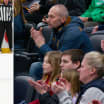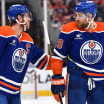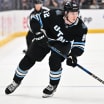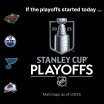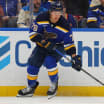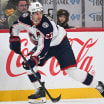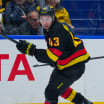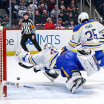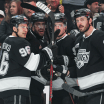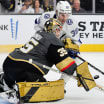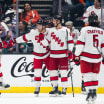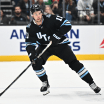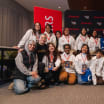Commissioner Gary Bettman's footprints were barely on the carpets of the NHL's Fifth Avenue headquarters in midtown Manhattan on Feb. 1, 1993, his first official day on the job, when he shared with reporters his vision for the League.
NHL has grown stronger in Bettman's 25 years as Commissioner
Expansion, outdoor games, revenue growth, competitive balance have become integral parts of League under his watch
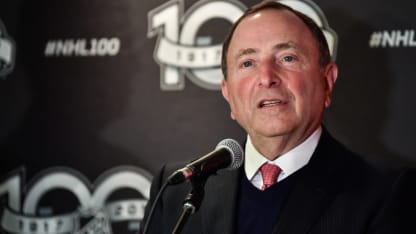
© Getty Images
By
Dave Stubbs @davestubbs.bsky.social
NHL.com Columnist
Elected the NHL's first Commissioner by the NHL Board of Governors not quite two months earlier, he stated, "I plan to be around for a while."
A quarter-century, and counting, would qualify as a while.
"As much as I had always appreciated hockey as a fan, being this close to great people in our game -- whether it's the fans or the players or the executives at the team and League level, or as importantly, my bosses, the owners -- this is more in a good way than I ever could have imagined," Commissioner Bettman said Thursday from his New York office.
"I had a great job (as senior vice president and general counsel for the National Basketball Association), but this to me was an exciting challenge and opportunity with a sport that I was really into."
The NHL had had five presidents since 1917: Frank Calder, Mervyn "Red" Dutton, Clarence Campbell, John Ziegler and Gil Stein. Campbell served 31 years, Calder 26. Today, on his 25th anniversary of service, Commissioner Bettman is the longest-tenured commissioner among the four North American major professional sports leagues.
Twenty-five years ago, Commissioner Bettman spoke to the media via teleconference about the topics of television, marketing and labor relations -- areas of expertise he had developed with the NBA.
"I'm committed to eliminating the off-ice distractions, so the fans can focus on what's happening on the ice," he told reporters. "The way to do that is to run yourself better. It means getting a good collective bargaining agreement and a stable relationship with the players. It means running your business in a businesslike way, so people don't have to read about owners or commissioners or labor leaders; they can read about the players doing wonderful things on the ice."
Today's NHL is not the same 24-team League that existed when Commissioner Bettman took office midway through the 1992-93 season. It has grown to 31 teams, from 787 players to more than 1,000. Regular-season attendance in 1992-93 was slightly more than 14 million; this season, it will exceed 22 million.
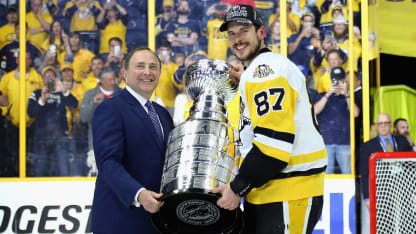
© Bruce Bennett/Getty Images
Expansion fees 25 years ago were $50 million. They are 10 times that now, at $500 million -- a next expansion, should it happen, would carry a fee of $650 million -- and franchises today are more valuable than ever.
Landmark broadcast, digital and sponsorship contracts have been signed in the past 25 years, and the reach of the NHL to a global audience has risen dramatically, its profile soaring through blossoming social media networks.
From zero social media followers to 13.4 million and growing by the day, the League is consumed today by fans worldwide on computers and via tablet and smartphone applications 24 hours a day, with games available in real time on multiple platforms. Online, fans around the world can access content in eight languages at NHL.com, the League's website, and find a wealth of statistical information never before available, including summaries of every game played since the League's creation in 1917.
In 2017, the NHL marked its centennial with a year-long calendar of special events, games and a documentary film, a celebration of its greatest moments and its players -- both the legendary superstars and the lesser-known players.
The Centennial celebration, the Commissioner said, was special because of the number of ways that the League "touched so many people, fans and our current and, most importantly, our former players and their families, including the 100 greatest.
"The connection that we have with our roots of the game, the history and the traditions that we have, are so special and we're so proud as a League to be in the place that we're in, to have evolved and grown from where we were in 1917. Recognizing that where we are is a function of where we've been is what made the centennial year so special."
The games themselves, 1,271 of them this season before the Stanley Cup Playoffs begin, are the cornerstone of the NHL, but they're just part of the story. With all-access programming and such productions as "Quest for the Stanley Cup," "Road to the NHL Winter Classic" and others, fans enjoy a behind-the-scenes look at players off the ice.
Outdoor games have proven hugely popular, with more than 1.2 million fans attending the 24 fresh-air games since the first Heritage Classic in Edmonton in 2003. The League has taken its show around the globe, as well, with contests in China and Europe as well as the participation of NHL players in five Olympic Games and three World Cups of Hockey -- the most recent in 2016 in Toronto.
The introduction of the salary cap and revenue sharing brought the NHL economic stability and a competitive balance that today is the strongest in League history.
During Commissioner Bettman's tenure, the NHL has created a number of important committees and departments, including the Competition Committee, the Department of Player Safety, and the NHL Injury Analysis Panel, today known as the NHL/NHLPA Joint Health and Safety Committee.
The rules have been tweaked, including the addition of compelling overtime -- initially with four skaters per side, now 3-on-3 -- and shootouts to decide a winner in every regular-season game.
Since 2000-01, two referees have worked every contest, their work aided by cutting-edge video review from a centralized location via high-definition cameras in and above the nets. On-ice officials have immediate communication with the League's video review room in Toronto.
The NHL has been active in the community, encouraging inclusion and participation at all levels. The League is contributing to worthwhile causes and pioneering community efforts with programs such as Hockey Is For Everyone, Hockey Fights Cancer and NHL Green.
As the NHL sets sail into its second century, Commissioner Bettman says that the great many moving parts in this global game do not allow him the luxury of focusing on one thing for too long.
"It's not one thing. It's never one thing," he said of what might be the greatest change in the NHL since he took office 25 years ago. "Everything is related to everything else. It's a series of things on a continuum as we continue to evolve.
"We have to continue to stay focused on the nuances of the game and how it's played. The fact is, the game has never been better or more competitive, our franchises have never been stronger and our fans have never been more numerous. We have to use that foundation to continue to grow, all through North America and the rest of the world, to connect with our fans, taking advantage of all of the digital technology. And that will continue to evolve."
